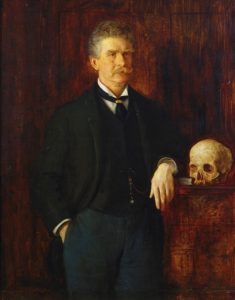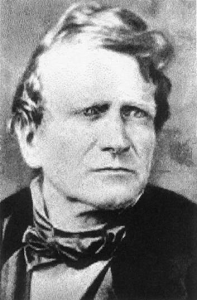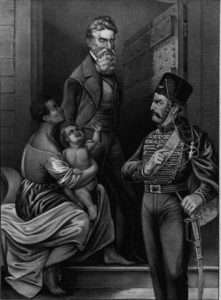Idealistic Uncle and Cynical Nephew: Lucius Bierce, Ambrose Bierce, and the Civil War – Part 1
Emerging Civil War welcomes back guest author Max Longley…
Part One: 1859 – Lucius’ prewar influence on Ambrose?

Ambrose Bierce (1842-1914?) was a journalist, satirist and writer of short stories about war and the supernatural who acquired literary fame over several decades and then mysteriously disappeared. Ambrose was famous for his harsh wit, which he used in both his journalism and in his stories to attack people and institutions he considered oppressive or foolish. Ambrose also likely had more Civil War combat service than his literary contemporaries. He wrote many stories and nonfiction accounts describing or inspired by his war experiences. These works were unsparing in showing the cruel and horrible parts of the war, the moral dilemmas which the more-or-less good soldiers could confront, and the wickedness of the bad soldiers. The distorting and sometimes decisive influence of fear is also present.[1] Less well known is Ambrose’s uncle Lucius Verus Bierce (1801-1876), an Ohio lawyer and public figure and a fascinating figure in his own right. Lucius might have influenced Ambrose before the war, and his home-front service during the war complemented his more famous nephew’s combatant experience. Focusing on Ambrose’s relationship with Lucius, I will examine in Part One the possible influences Lucius had over Ambrose when, at an impressionable age, Ambrose lodged at his uncle’s home in Akron just before the war. Then in Part Two I will look at the wartime experiences of uncle and nephew and the effect of that experience on their later lives, especially Ambrose’s.
In 1859, a teenage Ambrose lodged at Lucius’ Akron, Ohio house. Ambrose’s father Marcus Aurelius, Lucius’ brother, was a struggling farmer in Indiana alongside Ambrose’s mother Laura.[2] Biographer Roy Morris, Jr. thinks Ambrose’s distinctive and disturbing worldview came in part from the time he grew up with his parents; allegedly, Ambrose “was a casualty long before the first cannon fire at Fort Sumter.”[3] The teenage Ambrose suffered from bizarre nightmares – foreshadowing his later role as a literary “serial killer” who gave his characters morbid deaths. Young Ambrose probably spent a great deal of time brooding in graveyards. (Nor would the Civil War end Bierce’s exposure to the tragic and morbid, such as the death of his two sons, the breakup of his marriage, and the alleged sight of a dead friend’s ghost).[4] So at the time he lived with Lucius, Ambrose might not have been filled with stereotypical high spirits of peacetime youth. But he was at the age when the influence of a distinguished relative might help form his character.
Ambrose’s stay with Lucius has prompted speculation about the influence of the older man over the future author. Critic Lawrence Berkove says Lucius “perhaps…served as a role model for his nephew.” Morris says Lucius “was everything [Ambrose’s] father was not, and it is likely that Ambrose modeled himself, at least in part, after his rowdy, larger-than-life relative.”[5] While Ambrose apparently disrespected his father and saw him as a plodding farmer, Lucius’ adventures as a revolutionary and politician could have been more appealing to Ambrose’s adventurous nature.

By 1859, Lucius was a prominent Akron lawyer known for his occasional biting wit. Unlike with Ambrose’s journalistic insults, there was to be no printed collection of Lucius’ forays against courtroom opponents, but later reminiscences of other lawyers indicated that Lucius’ verbal asperities were well-remembered, and were brought out in self-defense against insult.[6]
Lucius’ satirical side dated to his younger days when he toured the South in 1822-23. His travel journal recorded opposition to slavery. Writing about South Carolina, he opined that black people possessed the virtue of gratitude but had “few occasions for its exercise.” He acidly commented on a law which provided for the seizure of wandering black people and their sale into slavery if no master showed up to claim them: “Thus, like the water ordeal for witches, he [the black person] is sure to drown or be burnt – free or not.”[7] We can observe something of an “Ambrosian” satirical note in the young traveller’s barbed criticisms against people and systems he disliked.
Lucius may have given his young nephew some exposure to military matters – though with an admixture of heroic idealism which is, to put it mildly, not reflected in Ambrose’s later cynicism toward military leaders and civilian war-mongers, his opposition to battlefield idealism, and his explicit descriptions of battle deaths. Lucius had been active in the Ohio militia throughout his career, rising through the ranks. In 1832 Lucius wrote to a friend about the prospect of a “tolerable scrap” between Northern troops (including the Ohio militia) and Southern forces if Virginia joined South Carolina in the then-roiling Nullification controversy. As it turned out, South Carolina stood alone and the conflict was avoided, but Lucius had prophetically suggested a possibility of united Southern defiance which might lead to a serious clash.[8]
Lucius’ actual battlefield experience involved a privately-organized military expedition and resulted in failure, but he managed to spin it as a heroic defeat. Lucius led American volunteers across the Canadian border in December 1838 in support of anti-British rebels. The untrained troops were defeated at the Battle of Windsor, but Lucius parlayed his illegal adventure (for which he avoided conviction in a sympathetic American judicial system) into popularity, helping him win election to several terms as mayor of Akron, as well as several local offices. He believed that the militarily unsuccessful raid had scared the British into granting political concessions to the Canadian people.[9] Lucius may have discussed such matters with young Ambrose in 1859. Curiously enough, in 1914 Ambrose would vanish after proclaiming an impending foreign military adventure of his own – this time south of the border rather than north. Ambrose would make a joke about mankind “infest[ing] the whole habitable earth and Canada,” so his sympathy for America’s northern neighbor may not have been as great as that of his uncle.[10]
The uncle’s spiritual influence on Ambrose presents interesting questions. At first, it seems unpromising. Lucius was a devoted Mason – in 1859 he had long been head of the Lodge in Akron, except a break a few years previously when he headed the Grand Lodge of Ohio. Ambrose would mock Masonic rituals and titles: “[G]lorify a page of your humdrum life by the blazonry of meaningless mystery, attain to the dignity of Most Worshipful Blue Ring-Tailed Turtledove and Past Arch Grand Lunatic.” Lucius wrote a few decades earlier of his opposition to “infidelity” – anti-Christianity. Ambrose would be known for doing his best to promote “infidelity” – to attack the Christian religion. How, then, could Ambrose have picked up spiritual insights in his uncle’s house? It turns out that, at the time of Ambrose’s stay, Lucius was exploring spiritual issues at least somewhat related to Ambrose’s later speculations. In 1859, while Darwin’s Origin of Species roiled the intellectual and spiritual worlds, Lucius was preaching, for his Masonic colleagues and perhaps for interested listeners like Ambrose, a doctrine of “Progressive Creation” speaking of a universe decaying and replenishing itself according to a “law of production, decay, and reproduction.”[11]
Like Lucius, though in a more depressing vein, Ambrose would come to see the universe as orderly. An “Accident,” his “Devil’s Dictionary” would say, was “[a]n inevitable occurrence due to the action of immutable natural laws.” Fate – and hardly a benevolent fate – ruled Ambrose’s universe. Ambrose would say that “the Scheme of the Universe” acted to “weed out the incompetent and their progeny,” putting to a darker use that Darwinism which was in the background of Lucius’ pre-Civil War meditations.[12] Ambrose moved beyond Lucius’ Masonic-friendly religion of a good, orderly universe, believing instead in a malevolent world-ruling spirit – which might be literal or figurative depending on when he wrote.[13]
Later in life, Ambrose tried to console himself and others with the Stoic philosophy – focusing on one’s own virtue and not being upset by outside events – recommending the Stoic teacher Epictetus to others experiencing grief and distress. Ambrose might have read Lucius’ edition of another Stoic philosopher, Seneca. This was an updated seventeenth-century translation of extracts from Seneca’s works, covering ground similar to Epictetus.[14]

Bierce scholars generally credit Lucius for sending Ambrose to the Kentucky Military Institute near Frankfort in 1859 and paying his nephew’s tuition. It seems the nephew only attended briefly and never graduated.[15] If the uncle indeed chose a Southern military institute, it would have represented a curious choice. He was an abolitionist, Underground Railroad conductor, and radical Republican who wished everyone to be “politically equal, without distinction of race or color.” When John Brown came to Akron in 1856, Lucius gave the abolitionist crusader some weapons from local militia warehouses to help fight proslavery forces in Kansas. Brown may have used some of the swords thus obtained to kill a proslavery Kansas family in a night raid.[16] In Akron on December 2, 1859, the day of Brown’s hanging in Virginia, Lucius gave a rousing speech in defense of the militant’s actions. “Thank God! I furnished him arms,” he boasted. “Brown has fallen at a political Bunker Hill, but a York-Town is yet to come.” The courts closed at Lucius’s request in honor of Brown.[17]
Ambrose, whether or not he was as conscious of the looming crisis as Lucius, did various odd jobs in Elkhart, Indiana until the outbreak of the war.[18] In 1861, he joined the Union army as a private in the 9th Indiana Infantry. Ultimately, he served on the staff of the brigade commander, General William Hazen. Ambrose started off fighting in western Virginia (soon to be West Virginia) in 1861. These early skirmishes in the Appalachian mountains formed the basis for “A Horseman in the Sky.” The latter uses the beautiful mountain setting as the backdrop for the cruel drama of a Union soldier who decides he has to kill his Confederate father. Ambrose was in the bloody battle of Shiloh, inspiring several stories. In 1862 he campaigned in Tennessee and Alabama, inspiring “An Affair of Outposts” and Bierce’s most famous Civil War story (perhaps his most famous story entirely), the haunting and chilling “An Occurrence at Owl Creek Bridge”. The battle of Stones River inspired “A Resumed Identity”, about a Civil War veteran whose visit to the battlefield decades later gives him such a vivid flashback that he thinks he’s back in the thick of the fighting. In the campaigns leading up to Chickamauga, and in the battle itself, Ambrose’s duties as military topographer helped him fix the scenery in his mind for future literary use, and the horrors of the campaign and battle led to several stories – most notably “Chickamauga”. In the latter story, a little boy wanders the battlefield where his observations magnify the readers’ horror because of the innocence of the little spectator.[19]
See Part 2 here…
—-
Max Longley is the author of Quaker Carpetbagger: J. Williams Thorne, Underground Railroad Host Turned North Carolina Politician (McFarland, 2020), For the Union and the Catholic Church: Four Converts in the Civil War (McFarland, 2015), and many articles.
—-
[1] Roy Morris, Jr., Ambrose Bierce: Alone in Bad Company (New York: Oxford University Press, 1995), 204; Lawrence I. Berkove, A Prescription for Adversity: The Moral Art of Ambrose Bierce (Columbus: Ohio State University, 2002), 37.
[2] Morris, 9.
[3] Morris, 190-91.
[4] Morris, 13, 151-52, 190-91, 205-07.
[5] Berkove, 3; Morris, 11, 15-16.
[6] Raymond Burnette Pease, Growing Up With the Western Reserve: A Biography of Lucius Verus Bierce (1801-1876), 1930 manuscript in Bierce Library, University of Akron, copy kindly furnished to the author by library staff, 68-69
[7] Lucius Verus Bierce (George W. Knepper, ed.), Travels in the Southland: The Journal of Lucius Verus Bierce (Columbus: Ohio State University Press, 1966), 51, 53-54, 80-81, 86, 121n45
[8] Pease, 64.
[9] Ruth Dunley, The Lost President: A. D. Smith and the Hidden History or Radical Democracy in Civil War America (Athens: University of Georgia Press, 2019), 42, 44-45, 48; Pease, 70-81, 83, 85; “Cleveland and the Past and Present Invasions of Canada,” Cleveland Daily Leader, Morning Edition, June 22, 1866, 3, column 2 (blaming Lucius for the failure of the 1838 raid); Lucius Verus Bierce, “Cleveland, and the Past and President Invasions of Canada,” Cleveland Daily Leader, Morning Edition, June 29, 1866, 1, column 5 (Letter to the editor from Lucius defending his conduct in the 1838 raid).
[10] Ambrose Bierce (S. T. Joshi, editor), Ambrose Bierce: The Devil’s Dictionary, Tales & Memoirs (New York: The Library of America, 2011), 556 (definition of “Man”).
[11] Morris, 159; Pease, 166-68. Some of Ambrose’s other mocking references to fraternal societies can be found in The Devil’s Dictionary, 596-97 (“Regalia”), 501 (“Resplendent”).
[12] Berkove, 38,40,42; Bierce, Devil’s Dictionary, 437.
[13] Morris, 205; Berkove, 44. Other mocking references to fraternal societies can be found in The Devil’s Dictionary, 596-97 (“Regalia”), 501 (“Resplendent”).
[14] Pease, 169; “To the Reader,” in Seneca’s Morals, by Way of Abstract (Cleveland: A. B. and Company, 1855); Morris, 209; Berkove, 55, 60.
[15] Morris, 17-18
[16] Pease, 88b-88f 98-102, Kymberli Hagelberg, “The Fugitive Barber,” http://kymberlihagelberg.com/index.php/grown-blog/the-fugitive-barber/..
[17] Pease, 103-07; Lucius Verus Bierce, “Address delivered at Akron, Ohio, on the Evening of the Execution of John Brown, December 2, 1859” (Columbus: Ohio State Journal Steam Press, 1865), 9.
[18] Morris, 18-19.
[19] Other stories and their associated battles include “A Tough Tussle,” and “The Mockingbird” (west Virginia campaign); “What I Saw at Shiloh,” “Two Military Executions,” and “The Coup de Grâce” (Shiloh); “The Story of a Conscience,” “The Affair at Coulter’s Notch,” “Three and One are One,” “One Officer, One Man,” and “A Little of Chickamauga” (Chickamauga and the campaign leading up to it); “Jupiter Doke, Brigadier General” (Wauhatchie/the “Charge of the Mule Brigade”); “The Crime at Pickett’s Mill,” “Killed at Resaca,” and “One of the Missing” (Atlanta campaign); “The Major’s Tale” (battle of Nashville). David M. Owens, The Devil’s Topographer: Ambrose Bierce and the American War Story (Knoxville: University of Tennessee Press, 2006), 24-26, 31, 40-41, 42, 45, 46, 48-52, 93-100, 105-09, 115-17, 119, 145-46. These stories either have obvious settings, or Owens was able to figure out the most likely setting from historical evidence. Owens observes that “not only did Bierce write about the places he knew, but the action of his war stories occurs at times when he was at those places” (Owens, 126).
1 Response to Idealistic Uncle and Cynical Nephew: Lucius Bierce, Ambrose Bierce, and the Civil War – Part 1